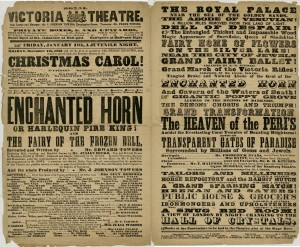After lots of hard work by a number of volunteers, I’m delighted to announce that we have now digitised almost all of our playbills for productions of works by Charles Dickens.
Although the bicentennial of Dickens’ birth was back in 2012, we have continued to work on this collection and, over the last few years, some very committed volunteers have made a wonderful contribution to this work.
Christopher Hall and Marjolijn Verbrugge spent a significant amount of time digitising all of our smaller playbills, which are now visible on our website. More recently, Elizabeth Grimshaw, who is completing an MA in Dickens Studies here at the University, has spent hours cataloguing our Dickens ephemera, and digitising the remaining (rather large) playbills as well as some illustrations. The digitisation involved Elizabeth painstakingly reconstructing the complete playbill in digital form from several digitised pieces, matching sections carefully to create an almost seamless effect. Matching up text and ensuring that the angles are correct is difficult at the best of times, and even more challenging with Victorian playbills and their miniscule text. Although a handful of the last playbills were digitised on the newly working oversize scanner, the majority of the credit for this work must go to our hard working volunteers!
The Dickens Collection has been assembled over many years and includes bibliographic gems, such as the nineteenth century part issues of Nicholas Nickleby (1838-1839), pieces of ephemera, such as some twentieth century ‘Pickwick’ playing cards, and illustrations. Amongst this assembly is a significant collection of Dickens theatrical material, particularly Victorian and Edwardian programmes, postcards and playbills.

Playbill advertising ‘Oliver Twist’ at the City of London Theatre, 11 December 1838, staged while the serialisation was ongoing.
Dickens was something of a sensation in his day (to put it mildly) and it wasn’t long before theatre managers decided to cash in on the popularity of his serialised works. Borrowing heavily from the books, the unofficial productions of lengthy works such as Oliver Twist included tableaux taken from the published illustrations and adapted the stories to suit their needs. In fact, the craze for all things Dickens was so great that hack playwrights, such as Edward Stirling and William Moncrieff, would make up their own endings for serialisations which had not yet been completed. With a lack of copyright protection, or an ability to police every theatre in Britain (never mind the spin-offs put on stage in America), there was little which Dickens could do about these plagerised versions but rail against them in prose.
In any case, the risks paid off for the theatre managers in early years, with Dickens’ first full length works immensely popular on stage. Around the time of Martin Chuzzlewit’s appearance, appetites for Dickens on stage appear to have abated somewhat, perhaps due to the fact that productions of Oliver Twist, Nicholas Nickelby and The Old Curiosity Shop were all still being performed, as well as A Christmas Carol, which was published in December 1843, part way through Chuzzelwit’s serialisation. Of course, even limited success for performances of Dickens’ work on stage still proved profitable, with Dickens later cashing in to produce ‘official’ versions of his works in an attempt to limit plagerism. Even today, with television largely occupying the space which the Victorian Theatre filled, adaptations of Dickens’ works are widely popular.
We’re delighted that such an important section of the Dickens Theatrical Collection is now available on our website, with full zoom functionality, and would like to thank our volunteers for all their hard work.
If you’d like to learn more about performances of Dickens’ stories, take a look at our Dickens on Stage index.

